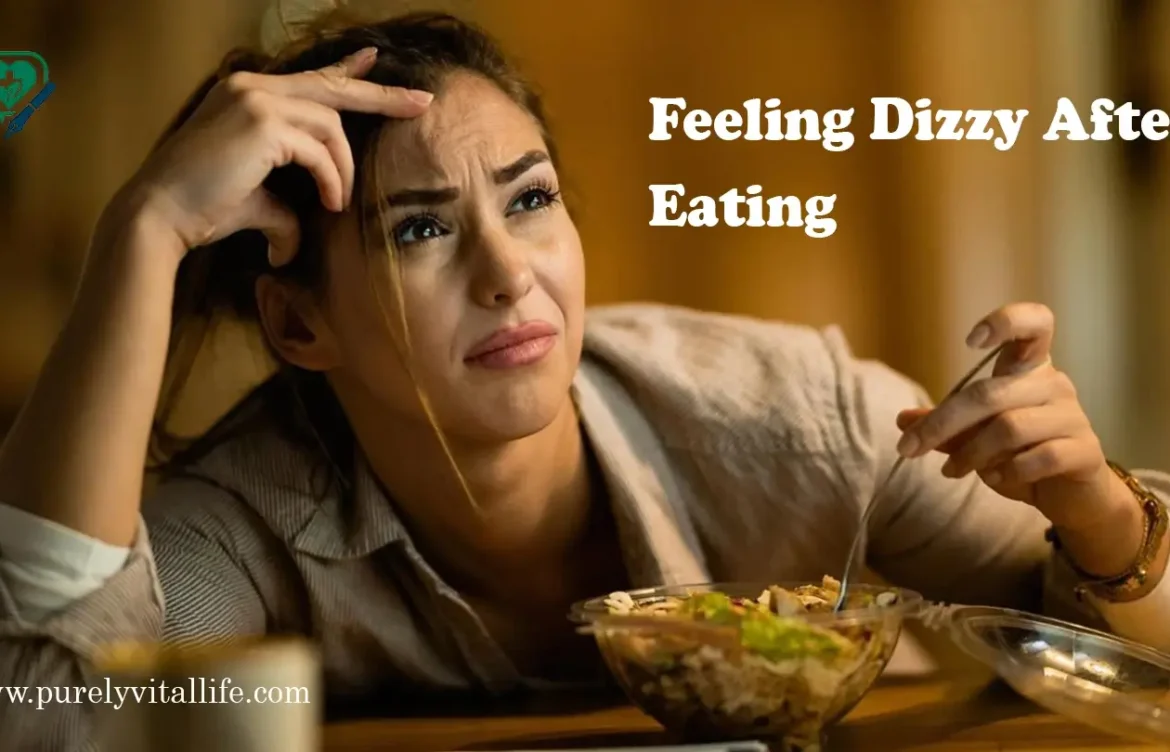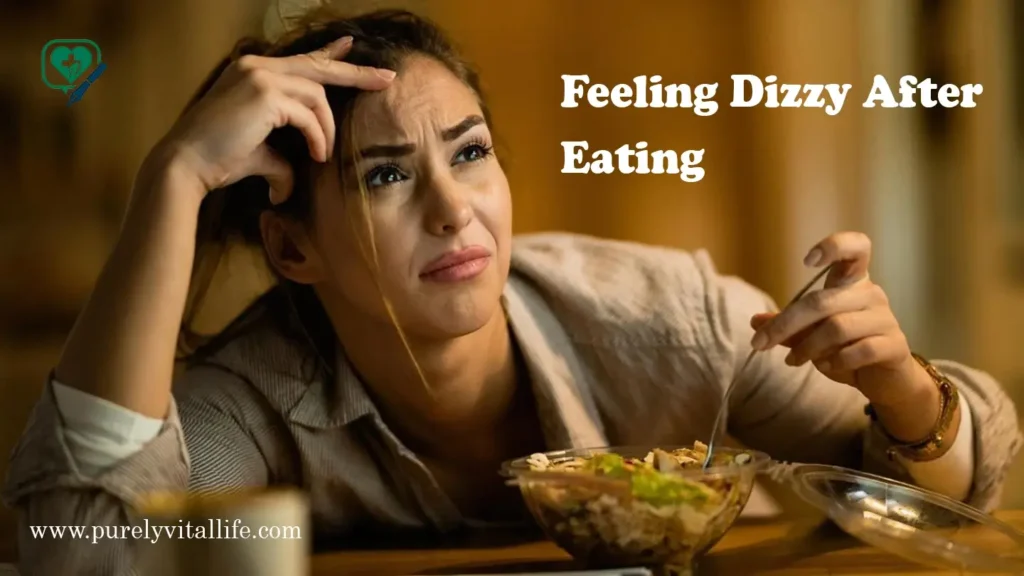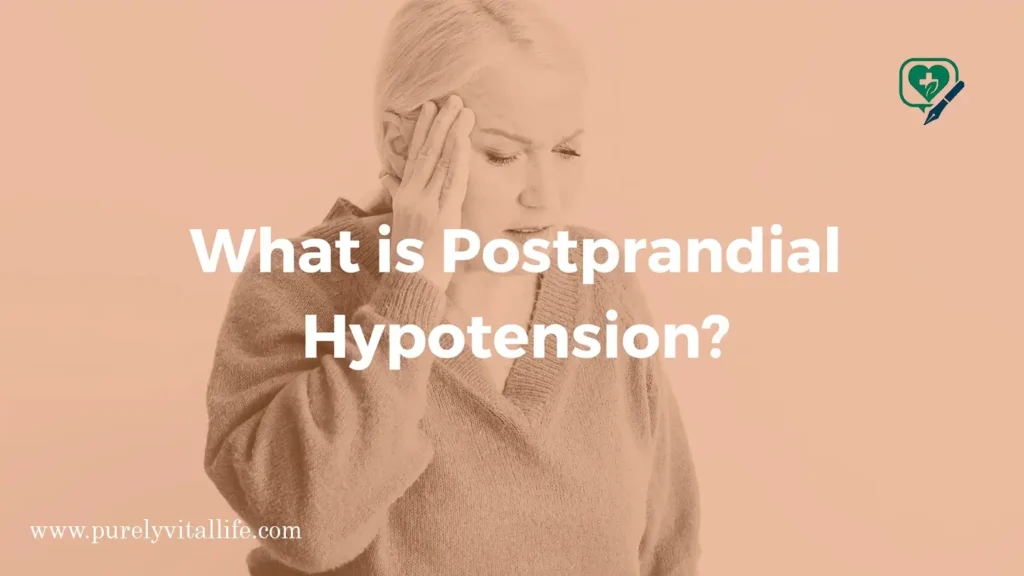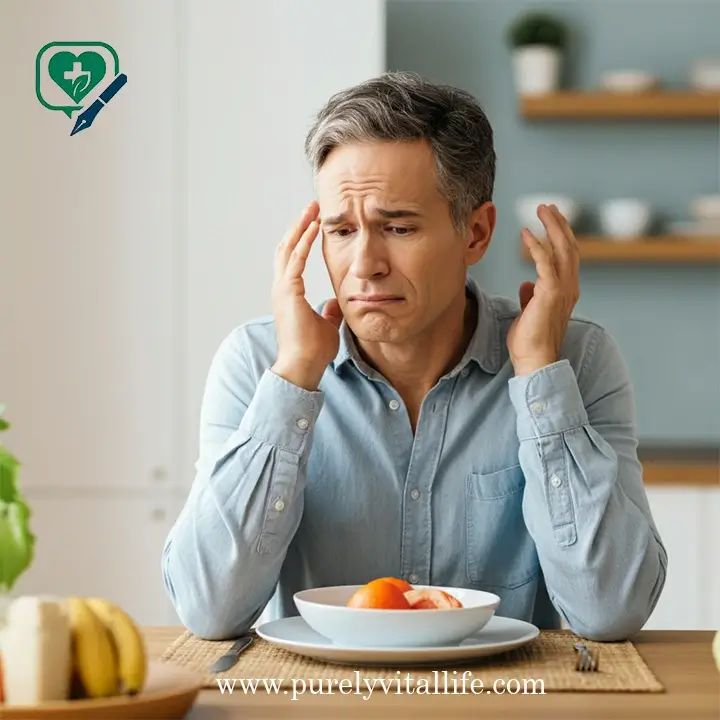
Feeling Dizzy After Eating? Understand the Causes and Find Relief:
Introduction to Feeling Dizzy After Eating:
You finish a meal and suddenly feel lightheaded, unsteady, or like the room is spinning. This scary feeling affects millions of people around the world. Many people wonder why this happens and how to make it stop. Feeling dizzy after eating, also called postprandial dizziness, is actually more common than you think. Even though it can feel alarming, learning the causes can help you take charge of your symptoms and feel better in your daily life.
In this guide, you will learn all about why you might feel dizzy after meals. We will talk about blood sugar changes, blood pressure drops, and other reasons. You will also find simple tips to stop these dizzy spells, meal ideas to keep your blood sugar steady, and advice on when to see a doctor.

What is Postprandial Dizziness and Why Do You Feel Dizzy After Eating?
Postprandial dizziness means you feel lightheaded, unsteady, or like the room is spinning after you eat. The word “postprandial” simply means “after a meal.” This condition can happen to anyone, no matter how old or healthy they are.
When you eat, your body starts many actions. Blood flows more to your stomach to help digest food. Your pancreas releases insulin to control your blood sugar. At the same time, your nervous system helps manage everything. However, these normal changes can sometimes cause an imbalance, making you feel dizzy.
You might feel like you are about to faint, the room is tilting, or you are floating. Usually, these feelings start 30 minutes to two hours after eating. But they can happen sooner or later depending on your body and the cause.
Also Read About Daily Selfcare Habits That Make a Massive Difference Over Time — >>>

Common Causes of Feeling Dizzy After Eating:
Reactive Hypoglycemia:
One big reason for dizziness after eating is reactive hypoglycemia. This happens when your blood sugar drops too low after a meal, usually within four hours.
- Here’s why:
You eat a meal with lots of sugar or white bread. Your blood sugar shoots up fast. Your pancreas reacts by releasing a lot of insulin to bring it down. Sometimes, it releases too much insulin, and your blood sugar drops too low. - When this happens, you may feel dizzy after eating sugar or foods like white bread, pastries, or candy. You might also feel sweaty, shaky, confused, or hungry soon after eating.
- Many people notice that they feel dizzy after meals full of refined carbs like pizza, white rice, or sweet cereal.
Blood Pressure Changes (Postprandial Hypotension):
- Another common cause of feeling dizzy after eating is postprandial hypotension, which means your blood pressure drops after eating. This affects up to 30% of older adults. It can make you feel dizzy, weak, or even cause fainting.
- When you eat, more blood goes to your stomach and intestines. Normally, your nervous system balances this by making your heart beat faster and tightening blood vessels. But sometimes, this doesn’t work well, and your blood pressure drops too much.
- If you have postprandial hypotension, you might feel dizzy, weak, nauseous, or sometimes even faint. These symptoms usually start 15 minutes to two hours after eating and can last for a few hours.
- Some things make this more likely, like being older, having diabetes or Parkinson’s disease, or taking certain blood pressure medicines.


Less Common Causes of Feeling Dizzy After Eating:
Food Sensitivities or Intolerances:
- Some people feel dizzy because they can’t handle certain foods. These are called food sensitivities or intolerances. Unlike allergies, these don’t involve your immune system but still make you feel sick.
- For example, lactose intolerance happens when your body can’t digest dairy. If you eat dairy, you might feel dizzy, bloated, gassy, or get diarrhea.
- Gluten sensitivity can also cause dizziness, along with brain fog or feeling tired after eating bread, pasta, or other wheat foods.
- Histamine intolerance is another reason. Foods like aged cheese, fermented foods, or some fish have a lot of histamine, which can make some people feel dizzy.

Inner Ear Issues or Vestibular Dysfunction:
- Your inner ear helps you keep balance. If you have a problem there, it can cause dizziness that seems linked to eating.
- Some people have a condition called vestibular dysfunction. High-sodium foods can change fluid levels in the inner ear, making dizziness worse, especially in conditions like Meniere’s disease.
- Certain foods like aged cheese, chocolate, alcohol, or foods with MSG can trigger dizziness in people who get vestibular migraines.
- Also, changes in blood flow after eating might affect your inner ear and make you feel dizzy.
When Should You Worry About Feeling Dizzy After Eating?
Sometimes, dizziness after eating is no big deal. But in some cases, you need to get help right away. You should call for emergency help if your dizziness after eating comes with:
- Chest pain or tightness
- A severe headache
- Trouble speaking or slurred speech
- Drooping face or weakness on one side
- Severe confusion
- Fainting or passing out
- Severe nausea and vomiting
These signs could mean something serious like a heart attack, stroke, or very low blood sugar.
You should also talk to a doctor if you:
- Feel dizzy often after eating
- Have dizziness that makes daily activities hard
- Lose weight without trying
- Keep feeling dizzy even after changing your diet
- Suddenly start feeling dizzy if you are over 65
- Have other health problems like diabetes or heart disease
A doctor can check for problems like diabetes, nerve damage, heart issues, or medicine side effects and help you make a plan.
Lifestyle and Dietary Adjustments to Help Stop Dizziness After Eating:
How to Stop Feeling Dizzy After Eating:
Eat Smaller, More Frequent Meals:
- One of the best ways to stop dizziness is to eat smaller meals more often. Big meals make your body work harder to digest, which can change your blood sugar and blood pressure more.
- Instead of three big meals, try eating five to six smaller meals each day. This keeps your blood sugar steady and makes digestion easier.
Balance Your Meals:
Eating meals with the right mix of foods helps a lot. Each meal should have:
- Lean protein (like chicken, fish, tofu, beans)
- Complex carbs (like whole grains, veggies, fruits)
- Healthy fats (like avocado, nuts, olive oil)
- Foods with fiber
This mix slows down how fast sugar enters your blood, stopping spikes and crashes that cause dizziness.
- Stay Hydrated:
Drinking enough water is important to keep your blood pressure and blood flow normal. Drink water all day, but don’t drink too much at meals because it might make digestion harder. - Being dehydrated can make dizziness worse. Try to drink at least 8 glasses of water a day, or more if you exercise or it’s hot.
Avoid Sugary or Processed Foods:
Sugary foods and processed snacks make blood sugar spike and then drop fast, which can cause dizziness.
Try to avoid:
- Soda and sweet drinks
- Candy
- White bread and other refined grains
- Chips and processed snacks
- Foods with lots of added sugar
Exercise Regularly:
- Exercise helps your body handle blood sugar and improve blood flow. Moving your body can lower your chances of dizziness after eating.
- Even a short walk after a meal can help with digestion and blood sugar. Try to get at least 150 minutes of exercise every week.
Sample Meal Plans for Managing Postprandial Dizziness:
These meal ideas help keep blood sugar steady and stop dizziness:
Plan 1: Balanced Breakfast:
- 2 scrambled eggs cooked with olive oil
- 1 slice of whole-grain toast
- 1/2 an avocado, sliced
- 1 cup of berries
- Herbal tea or black coffee (not too much caffeine)
This breakfast has protein, healthy fats, and slow-digesting carbs to prevent big sugar spikes.
Plan 2: Stabilizing Lunch:
- Mixed green salad with spinach and arugula
- 4 ounces of grilled chicken breast
- 1/2 cup cooked quinoa
- Cherry tomatoes, cucumber, bell peppers
- Olive oil and lemon dressing
- 1 small apple
This lunch gives you protein, healthy carbs, and lots of veggies to keep blood sugar steady.
Plan 3: Nutrient-Dense Snack:
- A small handful of unsalted mixed nuts
- 1 small pear
- 1 string cheese
This snack has protein, healthy fats, and fiber to help between meals.
Plan 4: Satisfying Dinner:
- 4 ounces of baked salmon
- 1 cup of steamed broccoli
- 1/2 cup roasted sweet potato
- A small side salad with olive oil dressing
This dinner has omega-3 fats, complex carbs, and lots of nutrients to support your health.
Each plan uses whole foods, balanced nutrients, and good portion sizes. This helps stop blood sugar ups and downs that cause dizziness after meals.
Read More About Build the Ideal Daily Routine for Adults in Just 30 Minutes a Day — >>>
Take Control of Your Post-Meal Dizziness:
Feeling dizzy after eating doesn’t have to take over your life. By learning about the causes — like low blood sugar or blood pressure drops — you can make changes to prevent it. With the right meals, habits, and help from your doctor if needed, you can stay steady and feel your best after every meal.
